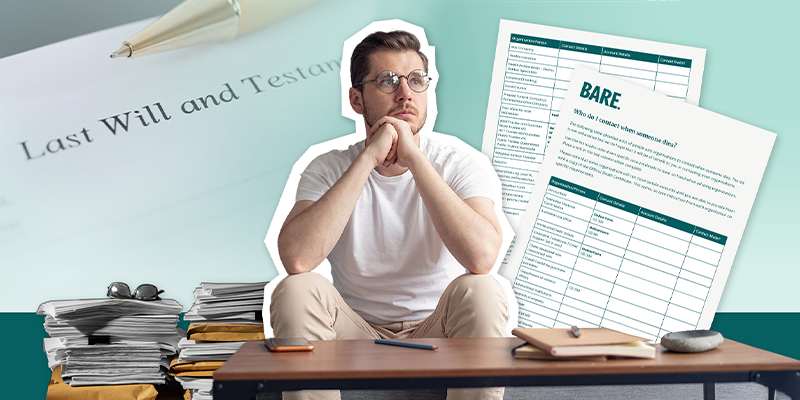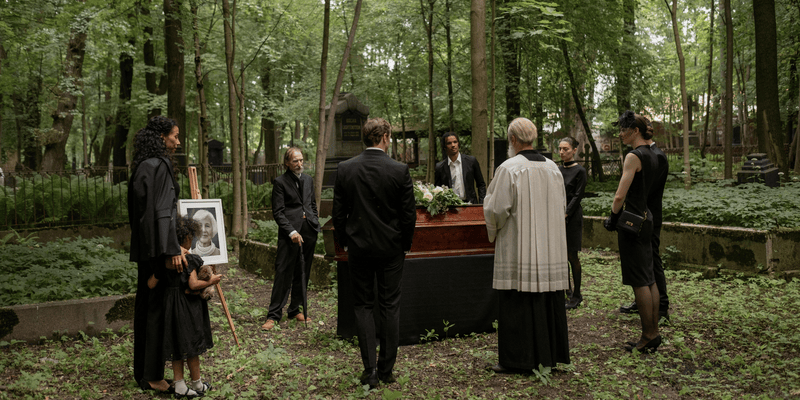Bare offers a simple and affordable cremation option without compromising on the level of service. Click below to see the price for your area.
Your loved one has just passed away. Whether it was something you were expecting or it has come as a shock, you are probably feeling quite lost. Your grief may be overwhelming and at the same time you are expected to keep going, make decisions and carry out some important tasks. It is common to feel like you don’t know what to do or can’t think clearly after someone dies. Feeling this way is quite normal at this time. You are coping the best you can, so don’t be hard on yourself.
When someone passes however, there are a number of things that you as their loved one needs to do. Here is a simple guide to help you through the first steps you need to take. Just take one step at a time and remember to call on help if you need it.
This guide is broken down into the following sections:
- Death at hospital or nursing home
- Death at home
- Organ donation and body donation
- Funeral arrangements
- Death certificate
- Financial entitlement arrangements (Insurance policies, superannuation, Wills)
- Who to notify when someone dies
- Financial matters
- Look after YOU
1. What to do when someone dies at hospital or a nursing home.
If your loved one has passed at a hospital or nursing home, generally the staff will call your chosen funeral director on your behalf and liaise with them to organise the transfer of your loved one. If they are in a larger hospital with a mortuary, the deceased can remain there until you have made a decision on who to call and arrangements have taken place for collection. Be mindful though, that if your loved one is in a smaller hospital or nursing home they often require collection more quickly as they do not have the required facilities. Just know that in such a situation you will need to make your decision on your chosen funeral provider quickly.
Despite the feeling that you may have to act quickly, remember you have the right to take the time you need to say your final farewell to your loved one. You should be given the time and space to do this.
If you have chosen to have your loved one cremated through a simple no-service cremation, the hospital can call us at Bare Cremation on your behalf on 1800 071 176 and we will organise to bring your loved one into our care.

2. What do I do when someone dies at home?
If your loved one dies at home, their death needs to be verified before your funeral provider can take them into their care. If death was expected, call your loved one’s doctor or palliative care nurse. They will need to come and examine your loved one to verify the passing.
If passing was not expected, call 000 and have an ambulance come. Once they come they can contact the police or doctor. If the death is unexpected and unclear, the police must be called. There is a possibility that your loved one may need to go to the Coroner if death was unexpected or suspicious. The police will make those arrangements at the time for you. Your chosen funeral service provider will then liaise with the Coroner for collection once your loved one has been cleared for release.
You can read more in our article 'What to do if someone dies unexpectedly' here.
3. Organ donation and body donation.
Your loved one may have already decided to be an organ donor, or you may be asked to donate their organs for eligible organ transplant patients. If this is the case the Next of Kin must give their consent before any procedure goes ahead. This is a decision you may need to make immediately after they die.
If your loved one has registered as a body donor, the Next of Kin will need to contact their body donation program as soon as possible after death. You can read more about donating your body to science here.
4. Organising funeral arrangements.
Your loved one may have already made arrangements for their funeral. If they had a prepaid funeral, contact the funeral provider to engage their services. If they had a funeral bond or funeral insurance, contact the company to organise the release of funds for funeral expenses. Unless the funeral bond specifies a particular funeral service provider you are otherwise free to engage any funeral service you wish at this time. Hopefully your loved one has kept documentation of any pre-arrangements for you so you are aware at the time you need them. Often such documents are kept with their will so now is the time to take out the will and see if there are any pre-arranged funeral arrangements in place.
If no previous arrangements were made the executor, or if no executor, senior Next of Kin has the authority to make funeral arrangements. Wishes left by a deceased in their will are not legally binding and the executor has the final decision on funeral arrangements.
You will now begin the process of organising a funeral. You need to make a number of decisions. Consider your options, take your time and do not feel pressured in paying for an expensive funeral because that is what you think you are expected to do.
At Bare, we believe the first week after your loved one has passed is such an emotionally sensitive time for you and not necessarily the time for putting on a large and expensive funeral service. That is why we can assist with carrying out the cremation process and at your own time and in your own way, when you are ready you can organise the perfect send-off for your loved one. For some ideas, read our article personalising a memorial: 10 alternatives to a traditional funeral service.

5. Death certificate.
Your loved one’s passing needs to be registered and an official death certificate from The Office of Births Deaths and Marriages will be issued. Generally, your funeral service provider will organise this for you and the death certificate will be issued to the person nominated as the informant, generally the executor or senior Next of Kin. Please note that this certificate is required before administration of a Will can take place.
6. Financial entitlement arrangements.
Did the deceased have any financial entitlement arrangements set up? You now need to try and find out if they had any of the following:
Insurance policies.
If someone has any kind of private health, sickness, accident, life or disability insurance policies, or any kind of funeral plan, then it is important to find the details and begin to action the policy. Contact the responsible insurance company. These claims can often take some time so it is a good idea to get on to this quite early.
Superannuation.
A person’s superannuation fund will often include some form of life insurance, so you should check that as soon as you can. Contact the Super Fund your loved one’s super was kept with to begin the process of making a claim. You can find out more about claiming the superannuation Death Benefit here.
Last Will & Testament.
If your loved one left a Will, locate it. A Will is a legal document that your loved one made while living and states how their estate, (property and assets) is to be distributed after their death. The executor of the will is responsible for distributing the person’s assets to the people named in the Will. This happens after any debts are paid. But before this can happen the executor must apply to court. It is wise to seek legal advice from a solicitor if you are the executor of a Will to assist with this process.
If the person has not left a Will, the estate is shared under a formula set by law. It is advisable to seek legal assistance about taking the correct procedure for distribution if someone dies leaving assets.

7. Who do I notify when someone dies?
There are many other organisations and people beyond those listed above that will need to be contacted to advise of the passing of your loved one. To make things a little easier for you we have created a checklist of who you may need to contact to notify of your loved one’s passing. You can use this form by filling in specifics of your loved one’s contacts and accounts and also marking when you have contacted someone. This is a handy form for you to actively fill out to help keep track of who you have contacted.
You can save/download our checklist images below:
-1.jpg)
-2.jpg)
Please note that often organisations will want to see a copy of the official death certificate when you contact them. This certificate will have been ordered by your funeral director and will come to you in the mail from The Office of Births Deaths and Marriages. They can take up to four weeks to arrive and longer if your loved one has been to the Coroner on passing, so you may need to be a little patient in this process of finalising the affairs of your loved one.
Also note that as soon as the bank becomes aware of your loved one’s passing, their bank accounts will be frozen. If you were needing funds to pay for funeral expenses most banks will release funds only for this purpose if you present to them an invoice from the funeral service provider. No other funds will be able to be withdrawn from any account held solely by your loved one once a bank has been notified and until the estate has been administered.
You can read more about advice for executors and Next of Kin on deceased estate accounts in our guide: What can be paid out of a deceased estate account?
8. Financial matters.
If your loved one contributed to your household income, their death can drastically change your financial situation. It is important to work out where you stand financially and seek support and financial advice if you need it.
For government assistance visit the Department of Human Services for possible financial support on the death of a loved one. They also have a Financial Information Service or call 136 357 for free financial assistance and advice.
9. Look after YOU.
Remember you are grieving. Allow yourself time to grieve and take time out if needed. You have permission to grieve. Understand that grief plays out differently in people and so be aware of how your mind, body and emotions are reacting to your situation. If you feel you are struggling with grief more than expected, speak to your GP. They can assist you with strategies for coping and referrals. Our article Experiencing grief on the death of a loved one might also help you understand the grieving process a little better.
There are also many bereavement services available to assist. A place to start would be the Australian Centre for Grief and Bereavement or for more immediate help call Lifeline on 13 11 14. Our list of grief counselling and support services across Australia includes more contacts that might help.
Remember the most important things in the first few weeks after your loved one has passed:
- Don't feel rushed or pressured into making decisions. There is no rush. Make the right decisions for you, your family, your loved one and your financial situation.
- Don't feel you have to do everything alone. Call out for help from family, friends or even professionals.
- Above all – look after yourself. Ensure you are sleeping, eating, taking time out for yourself and taking care of your emotional health.
To learn more about arranging a Bare Cremation or to get a quote, click the below button or give us a call on 1800 071 176. We offer simple cremations as well as estate administration services.







